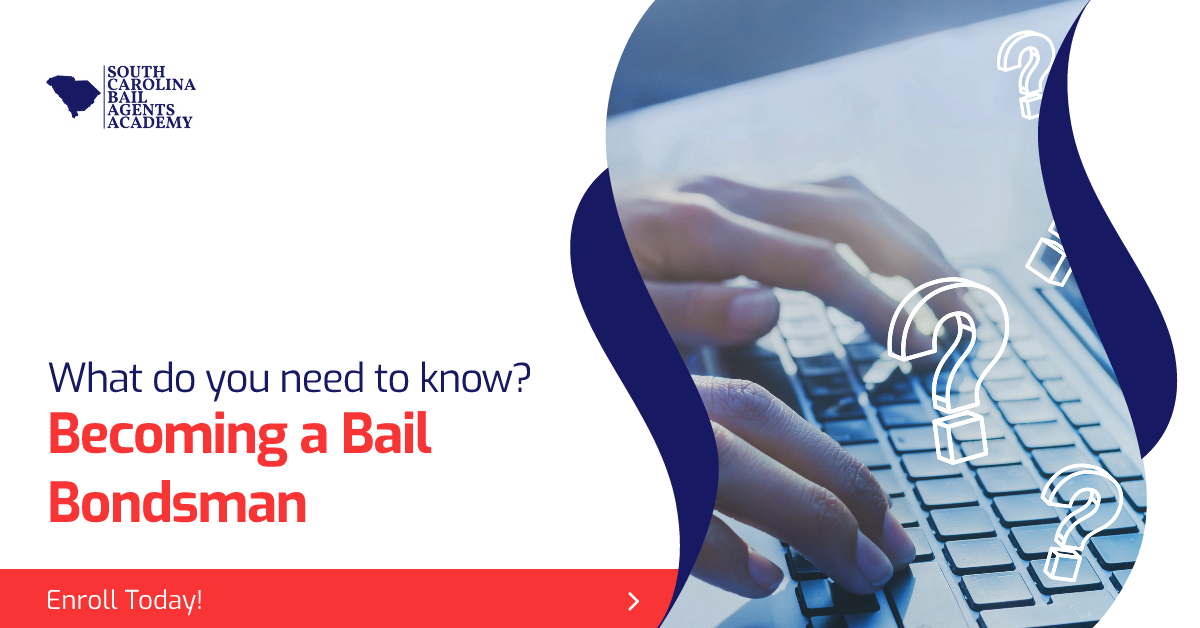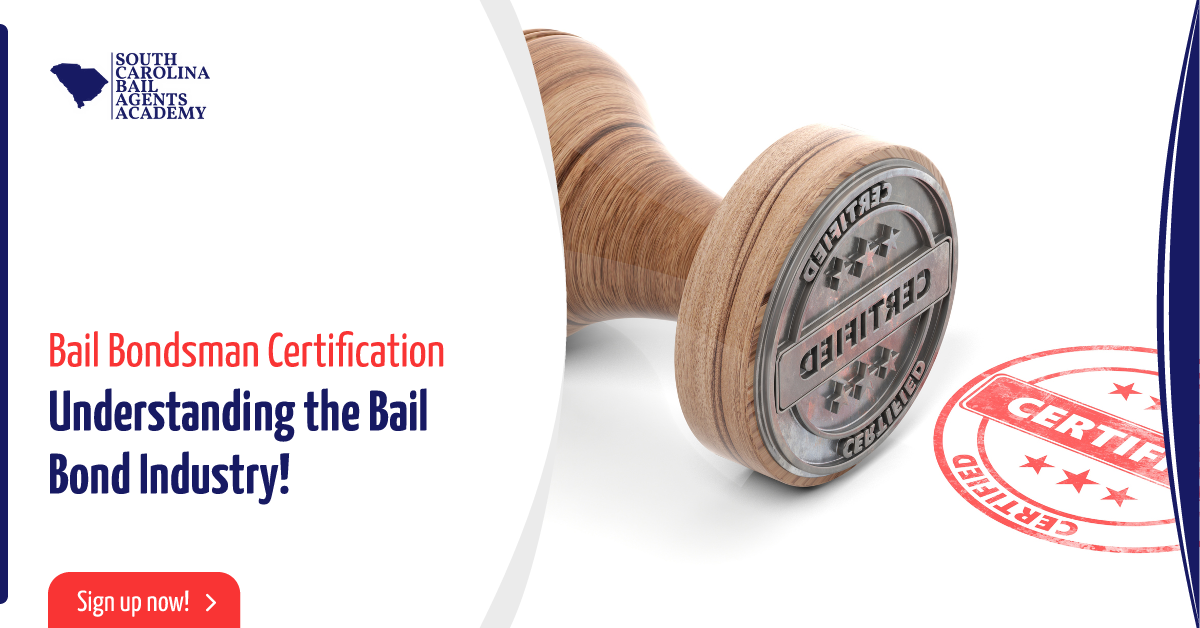|
Who can become a licensed bail bondsman? To become a licensed bail bondsman in South Carolina, you need to meet certain eligibility criteria, including:
These are the general licensing requirements for becoming a licensed bail bondsman in the state of South Carolina. The requirements for getting a bail bondsman license To become a licensed bail bondsman, you need to meet certain requirements set by your state's department of insurance. Here are the general criteria:
Steps to obtaining a bail bondsman license First, you need to meet the minimum requirements set by South Carolina, which includes being at least 18 years old, completing a thirty hour pre-licensing course, and passing the South Carolina state licensing exam offered through Pearson Vue. After that, you have to apply for a license from the South Carolina Department of Insurance. Once you receive your license, you can start working as a bail bondsman. Keep in mind that each state has its own specific requirements, so your South Carolina bail bondsman license requirements are different than other states. Bail bondsman license application process To become a licensed bail bondsman in South Carolina, you need to complete the application process set forth by the South Carolina Department of Insurance. Here are the general steps you can expect:
Pre-licensing education and training In order to become a licensed bail bondsman, you need to complete thirty hours of pre-licensing education and training. Ensure you complete this course with a reputable sponsor such as, South Carolina Bail Agents Academy, who offers both instant access and live education options. This training will provide you with the knowledge and skills necessary to work in the bail bonds industry. The content covered will include state laws and regulations, ethics, and the bail process. Completing this training is an essential step on the journey to becoming a licensed bail bondsman. Background check and licensing exam Before becoming a licensed bail bondsman in South Carolina, you must undergo a background check and pass a licensing exam. This process ensures that only qualified individuals are allowed to enter the profession. The background check will assess your criminal history and verify your personal and professional background. In South Carolina both SLED and FBI records checks will be processed through fingerprinting services offered by Identogo, and the results will be directly provided to the South Carolina Department of Insurance for processing The licensing exam will test your knowledge of the laws and regulations governing bail bonds. Passing these requirements is essential to starting your career as a bail bondsman. Maintaining a bail bondsman license To maintain your bail bondsman license, you must fulfill certain requirements on an ongoing basis. The annual requirements in South Carolina include meeting eight hours of continuing education, renewal license fees, and fingerprinting. It is essential to stay informed about any changes in the laws and regulations governing bail bonding in South Carolina, as failure to meet the licensing requirements can result in the expiration and cancellation of your license. Professional obligations and ethical standards As a licensed bail bondsman, you are expected to adhere to professional obligations and ethical standards. This means you must always act in the best interest of your clients, maintain confidentiality, and avoid any conflicts of interest. Additionally, you should conduct yourself with honesty, integrity, and transparency in all your dealings. Abiding by these standards ensures trust between you and your clients and contributes to the overall integrity of the industry. Career opportunities as a licensed bail bondsman Licensed bail bondsmen have the opportunity to work for bail bond agencies, insurance companies, or start their own business. The flexibility of this career allows you to create your own schedule and build your client base, offering a range of potential income opportunities. Conclusion and next steps If you've made it to this point, you now have a good understanding of what it takes to become a licensed bail bondsman in South Carolina. The next step is to complete your bail bond education, and find a reputable bail bonds agency to begin gaining practical experience in the field. Consider reaching out to local agencies, networking with professionals, and seeking mentorship opportunities to further your knowledge. Additionally, make sure to familiarize yourself with the specific licensing requirements in your state and start preparing for the licensing exam. Keep your determination strong, and stay focused on the goal of becoming a successful licensed bail bondsman.
0 Comments
Understanding bail bond certification To become a certified bail bond bondsman in South Carolina, you must complete a 30-hour Pre-Licensing Bail Bondsman class and pass a state exam offered by Pearson Vue. Achieving certification demonstrates your expertise and commitment to the profession. Certified bail bondsman have a deeper understanding of the legal and ethical responsibilities, procedural requirements, and professional standards in the bail bond industry. Certification also enhances your credibility and trustworthiness with clients and legal professionals. Importance of professional development Professional development is crucial for bail bondsman seeking career advancement and skills enhancement. Becoming certified in bail bond procedures and regulations demonstrates a commitment to excellence and expertise in the field. It can open doors to new job opportunities, higher earning potential, and increased credibility. Continuous learning and skill development allow bail bondsman to stay updated with industry best practices and legal requirements, ensuring they provide the best service to their clients. Moreover, certification can also lead to networking opportunities and professional recognition within the bail bond community. Qualifications for bail bond certification To become a certified bail bondsman in South Carolina, you need to meet the following qualifications:
These qualifications are essential for obtaining bail bond certification and starting a career in the industry. Obtaining bail bond certification Getting certified as a bail bondsman can enhance your professional skills and credibility. In the bail bond industry, certification demonstrates your competence and commitment to adhering to the industry's ethical and legal standards. The process of obtaining bail bond certification involves completing a comprehensive training program and passing an examination to validate your understanding of bail bond laws, regulations, and best practices. Certification can provide you with a competitive advantage in the field and open doors to more opportunities for professional growth and advancement. Learning opportunities and resources You can find learning opportunities and resources to enhance your bail bond certification through various courses and workshops. Many online platforms offer specific training programs that cover topics such as bail laws, court processes, and communication skills. Additionally, there are professional organizations and associations that provide access to industry-related articles, webinars, and networking events to further your professional development in the bail bond sector. Enhancing industry knowledge and skills By pursuing a bail bond certification, professionals can expand their industry knowledge and enhance their skills. Through certification programs, individuals can gain a deeper understanding of bail bond practices, legal regulations, and ethical considerations. Moreover, certification helps professionals stay updated with the latest industry trends and best practices, ultimately contributing to their professional development. Networking and career advancement Connecting with professional organizations and attending industry events can help bail bondsman expand their network and learn about career opportunities. Engaging with peers and mentors in the field provides valuable insights and potential leads for career advancement. Furthermore, obtaining bail bond certification can enhance credibility and open doors for new opportunities in the industry. Continuing education and updates Bail bond certification requires ongoing continuing education and training to keep professionals updated on the latest industry regulations, practices, and techniques. In South Carolina you must complete 8 hours of continuing education annually. It is essential for bail bondsmen to stay current with changes in laws, court procedures, and best practices to ensure they can provide the best service to their clients. This ongoing education and training play a crucial role in the professional development of bail bondsman, enabling them to stay informed and competent in their field. Demonstrating credibility and expertise To demonstrate your credibility and expertise in the bail bond industry, obtaining a bail bond certification is essential. It shows your commitment to professional development and assures clients and employers of your knowledge and skills. Certification also provides a competitive edge in the job market and can lead to better career opportunities. Additionally, it signifies that you adhere to industry standards and ethical practices, enhancing trust and confidence among clients. Conclusion: Advantages of bail bond certification Obtaining a bail bond certification can greatly enhance your professional development in the bail bond industry. By becoming certified, you increase your credibility and demonstrate your expertise to clients and agencies. This can lead to more opportunities for business and career advancement. Additionally, certification allows you to stay updated on industry trends and best practices, which can improve the quality of your services. Finally, many certification programs offer networking opportunities with fellow professionals, providing a valuable support system and potential partnerships. "Understanding the South Carolina Bail Bonding Industry: Role of Bail Bondsman Certification"1/21/2024 The role of bail bondsman in South Carolina Bail bondsman in South Carolina play a crucial role in helping individuals secure their release from jail by posting bail on their behalf. They are required to be licensed by the state, which involves completing specific training and meeting certain criteria. Once licensed, bail bondsman can work with individuals who cannot afford to pay their bail amount upfront, providing them with an opportunity to await their trial outside of jail. This ensures that individuals are not unfairly detained due to their financial situation and allows them to continue their daily responsibilities while awaiting their court date. Importance of bail bonding industry regulation Regulation of the bail bonding industry is important to ensure that bail bondsman are properly trained and certified. This helps in maintaining professional standards and ensuring the protection of both the accused and the community. Licensed bail bondsman are required to adhere to specific codes of conduct and ethics, which helps in preventing unethical practices within the industry. Proper regulation also reduces the risk of fraudulent activities, which can be harmful to both the defendant and the legal system. Additionally, regulation ensures that bail bondsman have the necessary knowledge and skills to handle the complexities of the bail bonding process, providing a better experience for all involved parties. Understanding bail bondsman certification Certification for bail bondsman in South Carolina involves completing a thirty-credit hour pre-licensing course, passing an examination, and meeting certain eligibility requirements. As a licensed bail bondsman, you are authorized to post bail on behalf of defendants. This license ensures that bail agents have the necessary knowledge and skills to operate within the legal framework. Eligibility requirements for bail agent certification To become a licensed bail bondsman in South Carolina, you must be at least 18 years old, resident of the state of South Carolina, no felony convictions or crimes of moral turpitude in the prior 10 years. You'll also need to complete a pre-licensing education course approved by the Department of Insurance. After that, you must pass the state licensing exam. Additionally, you'll need to undergo a criminal background check upon application for licensure. Once licensed, you'll need to complete continuing education to renew your license annually. Application process for bail agent certification To become a licensed bail bondsman in South Carolina, you must complete an application form provided by the South Carolina Department of Insurance. The application requires you to submit personal and professional information, along with a non-refundable application fee. Additionally, you are required to complete a pre-licensing education course approved by the Department of Insurance. Upon completion of these requirements, you can take the state examination. Passing this exam is necessary to obtain your bail bondsman license. Examination and training for bail bondsman certification To become a licensed bail bondsman in South Carolina, you must pass an examination and complete training. This certification allows you to work as a bail bondsman in the state. The examination covers topics such as state laws and regulations related to the bail bonding industry, ethical and professional conduct, and the responsibilities of bail bondsman. The training provides a comprehensive understanding of the bail bonding process, including the legal and financial aspects. Upon successful completion, you will be eligible to apply for a bail agent license to start your career in the bail bonding industry. Renewal and continuing education for bail bondsman Renewal and continuing education are necessary requirements for bail bondsman to maintain their certification. According to the South Carolina Department of Insurance, bail bondsman must renew their license every year by paying the renewal fee and completing continuing education courses. These courses help bail bondsman stay updated on industry regulations and best practices. Failure to renew the license can result in suspension or revocation of the bail bondsman’s license. Duties and limitations of certified bail bondsman Certified bail bondsman have the authority to post bail on behalf of their clients, ensuring their release from custody. They are responsible for providing accurate information to the court and guaranteeing the appearance of the defendant at all required court dates. However, certified bail bondsman are limited in their scope, as they cannot practice law or offer legal advice. Additionally, they are prohibited from engaging in any activities that involve coercion, harassment, or unfair practices. Benefits of working with certified bail bondsman Working with certified bail bondsman can provide you with various benefits, including:
Conclusion: The significance of bail bondsman certification Certification ensures that bail bondsman are knowledgeable about the industry and have met certain standards, which can provide peace of mind for both the defendant and the courts. It indicates that the bail bondsman has undergone training and passed exams, demonstrating their competency in handling bail processes. Bail bondsman certification also helps to maintain the integrity of the bail bonding industry by promoting professionalism and ethical conduct among bail bondsman. Moreover, it serves as a form of consumer protection, ensuring that individuals seeking bail services are dealing with reputable and qualified professionals. Understanding the bail bond license examination When preparing for the bail bond license examination, it's essential to understand the exam structure and content. Here are some key points to consider:
Organizing your study materials Make sure to gather all the study materials you will need for the bail bond license examination. This includes textbooks, notes, online resources, and any practice exams or study guides. Having all your materials in one place will help you stay focused and organized during your study sessions. Create a designated study space where you can keep all your materials and minimize distractions. Additionally, consider using tools such as folders, binders, or digital organizers to keep your study materials sorted and easily accessible. This will help you save time and make your study sessions more efficient. Creating a study schedule To create an effective study schedule for your bail bond license examination, start by setting aside dedicated study time each day. Identify your most productive hours and allocate them to studying. Break down the exam topics into smaller, manageable sections and assign specific study sessions to each. Use a calendar or planner to map out your study schedule, including designated review sessions closer to the exam date. Consider incorporating short breaks to prevent burnout and maintain focus. Adhering to a consistent study schedule will help you stay organized and effectively prepare for your bail bond license examination. Effective study techniques When studying for your bail bond license exam, it's important to use effective study techniques to help you pass. Here are some tips to keep in mind when preparing for your exam:
By implementing these study techniques, you can increase your chances of passing your bail bond license exam with confidence. Utilizing practice exams and sample questions Practice exams and sample questions are essential tools to help you prepare for your bail bond license examination. They allow you to familiarize yourself with the format and types of questions you may encounter on the actual test. By simulating the testing environment, you can build your confidence and reduce test anxiety. Additionally, practicing with sample questions helps reinforce your knowledge and identify areas that may require further review. Consistent practice with these resources can significantly improve your performance on the exam. Seeking help from experts When preparing for your bail bond license examination, seeking help from experts can be a very beneficial strategy. Finding a mentor or a tutor who has experience in the field can provide you with valuable insights and guidance. Additionally, reaching out to professionals who have already passed the exam can give you practical tips and advice on how to approach the test effectively. Engaging with experts can help you gain a better understanding of the exam content and improve your chances of success. Managing exam anxiety It's normal to feel anxious before a big test, but there are ways to manage that anxiety. Some helpful tips include deep breathing exercises, visualization techniques, and practicing mindfulness. Additionally, getting enough sleep and eating a healthy meal before the exam can help your brain function at its best. Remember, it's normal to feel anxious, but with the right strategies, you can keep it under control and perform your best on the exam. Last-minute preparation tips Make sure to prioritize the topics that you find the most challenging and spend extra time reviewing those. It's also important to get plenty of rest the night before the exam, as a good night's sleep can help improve your focus and memory. Create a study schedule for the day before the exam to keep yourself organized and avoid feeling overwhelmed. Additionally, take short breaks during your last-minute prep to avoid burnout and maintain your concentration. Lastly, don't forget to stay hydrated and eat nutritious food to keep your brain functioning at its best. What to expect on exam day On exam day, expect to arrive at the testing center at least 30 minutes before your scheduled time. You will need to present a valid ID, such as a driver's license, passport, or state-issued identification card, for verification. Once inside the testing room, you will be provided with the necessary materials, such as a test booklet and answer sheet. Remember to remain calm, stay focused, and manage your time wisely during the examination. Be prepared to demonstrate your knowledge of the bail bond industry through a series of multiple-choice questions, scenarios, and case studies. Avoid distractions, and allocate enough time to review and revise your answers before submitting the exam. Conclusion and next steps So you've made it through all the study tips and are ready to take the next step in obtaining your bail bond license. Now, it's time to put all your knowledge and preparation to the test. Here are a few important next steps to take:
Remember, the ultimate goal is to become a licensed bail bond agent, so keep pushing forward with determination and focus. Good luck! What is a Bail Bond Career? A bail bond career involves helping individuals post bail and gain release from jail while awaiting trial. Bail bond agents may work for a bail bond company or operate independently. Agents also ensure that clients comply with court requirements and may apprehend them if they fail to appear in court. The career offers flexible working hours, potential for high earnings, and the opportunity to help people in difficult situations. However, it can also involve high levels of stress, irregular working hours, and possible exposure to dangerous situations. Pros of Choosing a Bail Bond Career Choosing a career as a bail bond agent can offer lucrative earning potential. Bail bond agents have the opportunity to help individuals navigate the legal system and make a positive impact on their lives. Other benefits of pursuing a career in the bail bond industry include flexibility in work hours, the potential for high commissions, and the ability to work independently. Additionally, a bail bond career may provide a sense of fulfillment by assisting individuals in difficult situations. Cons of Choosing a Bail Bond Career While working as a bail bond agent can be financially rewarding, it also comes with its set of challenges. Here are some of the drawbacks to consider when choosing a bail bond career:
Considering these factors is essential before pursuing a career in bail bonds. Qualifications and Training Before you consider a career in bail bonds, it's important to know the qualifications and training required. Here are some key points to keep in mind:
Job Responsibilities In a bail bond career, your main responsibilities include:
Salary and Earning Potential According to the Bureau of Labor Statistics, the median annual wage for bail bondsman was $46,990 in May 2020. The lowest 10 percent earned less than $29,540, and the highest 10 percent earned more than $85,900. However, it's important to note that these earnings can vary based on factors like geographic location, experience, and specific employer. Work Environment The work environment for a bail bond career may involve long and irregular hours, including evenings, weekends, and holidays. Bail bond agents often work in high-stress situations and interact with individuals who may be facing legal, financial, or personal challenges. On the other hand, the work can be rewarding as it provides an opportunity to help individuals navigate the legal system and reunite with family and loved ones. Challenges in the Bail Bond Career In the bail bond career, one of the main challenges is dealing with difficult and potentially dangerous individuals. This can include confrontations with clients and the need to work in high-stress situations. Additionally, the industry can have inconsistent income and irregular work hours, making it challenging to maintain a work-life balance. Maintaining strict confidentiality and adhering to legal guidelines also poses challenges. Summary and Conclusion The Bail Bond career has its pros and cons to consider. On one hand, it offers the potential for a flexible schedule and the opportunity to help individuals in challenging situations. However, it also requires a high level of responsibility and may result in exposure to dangerous environments. Ultimately, the decision to pursue a career in this field should be carefully evaluated based on individual preferences and capabilities.  What is Bail Agent Certification? Bail agent certification is a recognized credential that demonstrates a bail agent's competence and knowledge in the bail bond industry. It involves undergoing training and passing an examination to ensure that the agent understands the legal and ethical responsibilities associated with the profession. Bail agent certification can provide individuals with the opportunity to enhance their career prospects and gain credibility within the industry. Advantages of obtaining Bail Agent Certification The advantages of obtaining Bail Agent Certification are numerous. By becoming a certified bail agent, you can enhance your career prospects and gain credibility in the industry. Here are a few benefits:
Career opportunities with Bail Agent Certification Bail agent certification can open up new opportunities in the criminal justice field. With this certification, you can work as a bail enforcement agent, also known as a bounty hunter, helping to track down and apprehend individuals who have skipped bail. You can also pursue a career as a bail bond agent, facilitating the release of defendants from custody by ensuring they appear in court as required. Additionally, this certification can lead to employment in the legal and law enforcement industries, providing a pathway to a rewarding and dynamic career. Prerequisites for obtaining Bail Agent Certification To obtain Bail Agent Certification, you must meet certain requirements. These may include completing a pre-licensing course, passing an exam, and undergoing a background check. Each state has its own specific prerequisites, so it's essential to research the requirements in your state before pursuing certification. Some states may also require applicants to meet certain age and education criteria. It's important to thoroughly understand and fulfill these prerequisites in order to successfully obtain Bail Agent Certification and boost your career. The process of getting Bail Agent Certification Becoming a certified bail agent involves completing a training program and passing an examination. The training will cover topics such as state laws, ethics, and the responsibilities of a bail bondsman. The examination will test your knowledge of these subjects. Once you successfully complete the requirements, you will receive your bail agent certification, allowing you to start working in the field. The cost of obtaining Bail Agent Certification Getting certified as a bail agent can vary in cost. It depends on the specific requirements of your state, the training program you choose, and any additional fees for exams or materials. However, on average, obtaining Bail Agent Certification can range from $300 to $1,000 for the initial training and examination. Additionally, some states may require ongoing education and renewal fees to maintain your certification. It's important to consider these costs as an investment in your future career opportunities. Online vs. in-person training options Both online and in-person training options are available for bail agent certification. Online courses offer flexibility, allowing you to study at your own pace and without the need to travel. On the other hand, in-person training provides the opportunity for real-time interaction with instructors and other students. Consider your learning style and schedule when deciding between these options. Renewing and maintaining the Bail Agent Certification To renew and maintain your Bail Agent Certification, you need to complete a certain number of continuing education hours, depending on your state’s requirements. These hours can usually be obtained through courses, seminars, or workshops related to the bail industry. Additionally, you may be required to submit a renewal application and fee at regular intervals, typically every 1-3 years. It is important to stay informed about the specific requirements in your state to ensure that you remain in compliance with the certification regulations. Networking and support opportunities for Certified Bail Agents Certified Bail Agents have access to a strong network of professionals who provide guidance and support. This network offers valuable opportunities for career growth, mentorship, and learning from experienced bail agents. Additionally, certified bail agents have access to ongoing training and resources that can help them stay updated on industry best practices and regulations, keeping them competitive in the field. Summary and conclusion Bail agent certification can significantly boost your career opportunities in the bail bond industry. Obtaining this certification showcases your commitment to professionalism and quality service, making you a more attractive candidate for potential employers or clients. It also demonstrates your knowledge of the legal and ethical responsibilities involved in the bail bond process. With this certification, you can enhance your reputation, build trust with clients, and create new business opportunities. Additionally, the learning and networking opportunities provided during the certification process can further expand your skills and industry connections. Overall, pursuing bail agent certification can lead to a more successful and promising career in the bail bond profession. What are Bail Bond credits? Bail Bond credits, also known as continuing education credits, are earned by professionals in various industries to maintain their licenses or certifications. These credits are awarded for participating in specific educational programs, workshops, or training sessions related to their field. Bail Bond credits help professionals stay updated with the latest industry knowledge, enhance their skills, and ensure compliance with licensing requirements. The number of credits required may vary depending on the profession and jurisdiction. Professional development activities that qualify for bail bond credits can include seminars, online courses, conferences, and other relevant educational events. Importance of Bail Bond credits for professional development Bail Bond credits are essential for your professional development, as they can help you stay updated with the latest industry trends, regulations, and best practices. By earning Bail Bond credits, you demonstrate your commitment to continuous learning and improvement, which can enhance your credibility and expertise in your field. Here are some key points that highlight the importance of insurance credits for professional development:
Types of Bail Bond credits Bail Bond are provided as continuing education credits (CECs). CECs are earned by participating in educational programs related to your profession. In South Carolina, Bail Bondsman must earn 8 continuing education credits annually. Accumulating Bail Bond credits To get ahead in your professional development, it's crucial to keep track of your Bail Bond credits. These credits allow you to meet the requirements for maintaining your professional license and staying up-to-date in your field. Here's what you need to know about accumulating insurance credits:
By understanding the significance of Bail Bond credits and how to accumulate them, you can ensure your professional development remains on track and your license remains valid. Bail Bond credit requirements To maintain your professional credentials, you need to earn Bail Bond credits through continuing education. These credits are essential for staying up to date and improving your skills. The specific requirements for Bail Bond credits can very, so it's important to check with your professional organization for the latest guidelines. Keep in mind that the number of credits needed and the types of activities that qualify for credits may also differ based on your specific industry and role. Benefits of Bail Bond credits for professional development Bail Bond credits can play a significant role in supporting your professional development. Here are some benefits to consider:
Sources for earning Bail Bond continuing education To earn Bail Bond continuing education, you can consider the following sources:
How to track and manage Bail Bond continuing education To track and manage your Bail Bond continuing education, start by keeping a detailed record of all your professional development activities, including the date, type of activity, and number of credits earned. Use a spreadsheet or a specialized app to stay organized. You can also check your state's insurance department website for specific guidelines and requirements regarding credit tracking. Make sure to stay proactive and regularly review and update your credit records to ensure compliance with your licensing requirements. Impact of Bail Bond continuing education on career advancement Bail Bond continuing education plays a crucial role in career advancement. They can provide financial support for professional development activities such as further education, certifications, and training courses. By utilizing Bail Bond continuing education, professionals can enhance their skills, stay updated with industry trends, and increase their market value. Additionally, Bail Bond continuing education can offer opportunities for networking and mentorship that can further boost career growth. Understanding how to effectively leverage Bail Bond continuing education can significantly impact your career trajectory and open doors for new possibilities. Conclusion and summary In conclusion, understanding the impact of Bail Bond continuing education on your professional development is essential for maximizing your career growth. By carefully utilizing Bail Bond continuing education, you can access valuable resources to enhance your skills, stay updated with industry trends, and meet the evolving demands of your profession. It is crucial to regularly review your insurance benefits and take advantage of available Bail Bond continuing education to invest in your ongoing education and development. This proactive approach will not only benefit your career but also contribute to the success of your organization. Understanding the bail bondsman state examination
Studying for the bail bondsman state examination is crucial for obtaining your license. The exam covers legal requirements, regulations, and procedures related to the bail bond industry. You need to be well-versed in topics such as bail bond laws, ethical standards, and procedural guidelines. Make sure to study the latest legislation and industry best practices to prepare adequately for the exam. Understanding the specifics of the examination content and format will help you focus your study efforts effectively. Time management and stress-reducing techniques can also be beneficial during the examination. Importance of preparation Proper preparation is crucial for success in your bail bondsman state examination. Taking the time to study and review the material thoroughly can significantly increase your chances of passing the exam on your first attempt. Here are some important points to consider:
Study materials and resources To prepare for your mandatory bail bondsman state examination, you will need to gather study materials and resources that cover the relevant topics. It is crucial to have access to study guides, practice tests, and textbooks that focus on the laws, regulations, and procedures related to bail bonds in your state. Additionally, attending the mandatory 30- hour Instant Access course or live webinar course can provide valuable insights and exam-taking strategies to help you succeed in the examination. Online forums and communities can also be useful for connecting with others who are preparing for the exam and sharing tips and resources. Make sure to have a well-rounded set of materials to ensure thorough preparation for the examination. Creating a study plan Consider creating a study plan to effectively prepare for your bail bondsman state examination. A study plan will help you stay organized and focused on the material you need to cover. Break down the topics and sections you need to study into manageable chunks. Allocate specific time slots for studying each topic, and be sure to include regular breaks to avoid burnout. Additionally, make use of study materials and resources such as practice tests, study guides, and online tutorials to enhance your preparation. By creating a study plan, you can approach your bail bondsman state examination with confidence and better chances of success. Practice tests and quizzes To prepare for your bail bondsman state examination, it's important to take plenty of practice tests and quizzes. These tools can help you assess your knowledge and identify any areas where you may need further study. By regularly testing yourself on the material, you can build confidence and familiarity with the type of questions you're likely to encounter on the actual exam. It's recommended to seek out online practice tests and quizzes specifically designed for bail bondsman exams. Additionally, consider forming study groups with fellow aspiring bail bondsmen to create and take practice quizzes together. This collaborative approach can be a valuable way to reinforce your understanding of the exam material. Familiarizing with state laws and regulations It is crucial to familiarize yourself with the laws and regulations of the state where you will be taking the bail bondsman examination. Each state has its own set of rules and requirements for becoming a licensed bail bondsman. Key factors to consider include the legal requirements for obtaining a bail bond license, the regulations governing the bail bond industry, and any specific laws related to bail bonds in the state where you intend to practice. Taking the time to thoroughly understand the state laws and regulations will provide you with a solid foundation for successfully passing the examination and entering the profession. Memorization techniques Memorization techniques are essential for preparing for your bail bondsman state examination. Here are some effective tips to help you with memorization:
Time management strategies When preparing for the bail bondsman state examination, it's crucial to have effective time management strategies in place to optimize your study schedule. Here are some tips to help you manage your time efficiently:
By implementing these time management strategies, you can enhance your preparation for the bail bondsman state examination and increase your chances of success. Stress Management Stress management is key during your preparation for the bail bondsman state examination. Here are some effective tips to help you manage stress during this crucial time:
Summary and Final Tips Once you have reviewed all the study materials and feel confident in your knowledge, it's essential to take time to do a final review of the main concepts and important details. This can help reinforce your understanding and ensure you are fully prepared for the bail bondsman state examination. Remember to take regular breaks during your study sessions to avoid burnout, and focus on staying calm and confident when taking the exam. Additionally, make sure to get a good night's sleep before the big day to help keep your mind sharp and focused. Finally, don't forget to bring all necessary identification and paperwork to the examination center. These final tips can help you feel more at ease and ready to tackle the exam with confidence. Good luck! Step 1
Complete your South Carolina 30hr Professional Bail Bondsman, Surety Bail Bondsman, and Runner pre-licensing course:
Step 2 Register for the state mandated InsSC-BB16: SC Professional Bail Bondsman/Runner
Step 3 Complete your Property, Casualty, Surety & Marine Insurance Producer course
Step 4 Register for the state mandated InsSC-PCSM04: SC Producer Property, Casualty, Surety & Marine Insurance
Step 5 Register for fingerprinting
Step 6 Have a passport size photograph taken
Step 7 Apply for your South Carolina surety insurance producer license
Step 8 Once you receive your Limited Line producer license you may apply for your surety bondsman license.
Wait on the SCDOI to process your application, you will receive confirmation of your acceptance or denial to the address you have provided! Additional Info Take the guesswork out of the application process and book a one-on-one consultation: *Steps 1 and 3 may be done interchangeably Step 1
Take the state mandated 30hr bail bondsman runner course
Step 2 Register for the state mandated 19-16 bail bondsman/runner test
Step 3 Register for fingerprinting
Step 4 Have a passport size photograph taken
Step 5 Apply for your License:
Wait on the SCDOI to process your application, you will receive confirmation of your acceptance or denial to the address you have provided! |
AuthorDonald F. Mescia III Archives
April 2024
Categories |
"The South Carolina bail bond school securing your future"
|
Contact us Today
South Carolina Bail Agents Academy 845 Houston Northcutt Blvd #1010 Mount Pleasant, SC 29464 843-789-9416 Email Us |







 RSS Feed
RSS Feed